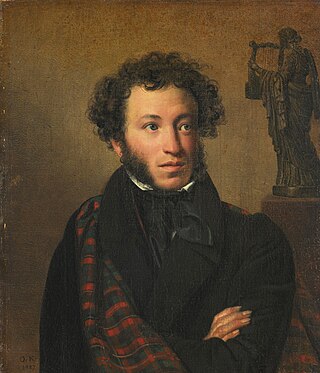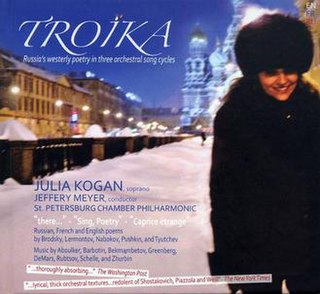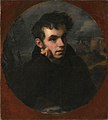
Alexander Sergeyevich Pushkin was a Russian poet, playwright, and novelist of the Romantic era. He is considered by many to be the greatest Russian poet and the founder of modern Russian literature.

Russian literature refers to the literature of Russia and its émigrés and to Russian-language literature. The roots of Russian literature can be traced to the Middle Ages, when epics and chronicles in Old East Slavic were composed. By the Age of Enlightenment, literature had grown in importance, and from the early 1830s, Russian literature underwent an astounding golden age in poetry, prose and drama. Romanticism permitted a flowering of poetic talent: Vasily Zhukovsky and later his protégé Alexander Pushkin came to the fore. Prose was flourishing as well. Mikhail Lermontov was one of the most important poets and novelists. The first great Russian novelist was Nikolai Gogol. Then came Ivan Turgenev, who mastered both short stories and novels. Fyodor Dostoevsky and Leo Tolstoy soon became internationally renowned. Other important figures of Russian realism were Ivan Goncharov, Mikhail Saltykov-Shchedrin and Nikolai Leskov. In the second half of the century Anton Chekhov excelled in short stories and became a leading dramatist. The beginning of the 20th century ranks as the Silver Age of Russian poetry. The poets most often associated with the "Silver Age" are Konstantin Balmont, Valery Bryusov, Alexander Blok, Anna Akhmatova, Nikolay Gumilyov, Sergei Yesenin, Vladimir Mayakovsky, and Marina Tsvetaeva. This era produced some first-rate novelists and short-story writers, such as Aleksandr Kuprin and Nobel Prize winners Ivan Bunin, Leonid Andreyev, Fyodor Sologub, Yevgeny Zamyatin, Alexander Belyaev, Andrei Bely and Maxim Gorky.

Mikhail Yuryevich Lermontov was a Russian Romantic writer, poet and painter, sometimes called "the poet of the Caucasus", the most important Russian poet after Alexander Pushkin's death in 1837 and the greatest figure in Russian Romanticism. His influence on later Russian literature is still felt in modern times, not only through his poetry, but also through his prose, which founded the tradition of the Russian psychological novel.

Yevgeny Abramovich Baratynsky was lauded by Alexander Pushkin as the finest Russian elegiac poet. After a long period when his reputation was on the wane, Baratynsky was rediscovered by Russian Symbolism poets as a supreme poet of thought.

Romantic poetry is the poetry of the Romantic era, an artistic, literary, musical and intellectual movement that originated in Europe towards the end of the 18th century. It involved a reaction against prevailing Enlightenment ideas of the 18th century, and lasted approximately from 1800 to 1850. Romantic poets rebelled against the style of poetry from the eighteenth century which was based around epics, odes, satires, elegies, epistles and songs.

Vasily Andreyevich Zhukovsky was the foremost Russian poet of the 1810s and a leading figure in Russian literature in the first half of the 19th century. He held a high position at the Romanov court as tutor to the Grand Duchess Alexandra Feodorovna and later to her son, the future Tsar-Liberator Alexander II.

Aleksey Nikolayevich Apukhtin was a Russian poet, writer and critic.
Anatoly Liberman is a linguist, medievalist, etymologist, poet, translator of poetry, and literary critic.
Vadim the Bold was a legendary chieftain of the Ilmen Slavs who led their struggle against Rurik and the Varangians in the 9th century.

Georgy Vasilyevich Sviridov was a Soviet and Russian neoromantic composer. He is most widely known for his choral music, strongly influenced by the traditional chant of the Russian Orthodox Church, as well as his orchestral works which often celebrate elements of Russian culture.

Sovremennik was a Russian literary, social and political magazine, published in Saint Petersburg in 1836–1866. It came out four times a year in 1836–1843 and once a month after that. The magazine published poetry, prose, critical, historical, ethnographic and other material.
Nationality words link to articles with information on the nation's poetry or literature.
This is a list of works by writer Vladimir Nabokov.

Troika: Russia's westerly poetry in three orchestral song cycles is a 2011 album of contemporary classical songs performed by soprano Julia Kogan, who also conceived the project. She is accompanied by The St. Petersburg Chamber Philharmonic conducted by Jeffery Meyer. The songs are set to Russian, English, and French language poetry by five classic Russian writers: Joseph Brodsky, Mikhail Lermontov, Vladimir Nabokov, Aleksandr Pushkin and Fyodor Tyutchev. Eight modern composers, from France, Russia, and the United States, wrote music for the album: Isabelle Aboulker, Ivan Barbotin, Eskender Bekmambetov, Jay Greenberg, James DeMars, Andrey Rubtsov, Michael Schelle and Lev Zhurbin.

Alexander Fyodorovich Voeykov was a Russian poet, translator, literary historian and journalist, best known for his satirical poems of 1814-1820.

Andrey Alexandrovich Krayevsky was a Russian publisher and journalist, best known for his work as an editor-in-chief of Otechestvennye Zapiski (1839–1867), the influential literary journal of which he was also publisher. Another well-known publication Krayevsky founded was the popular newspaper Golos.
Taif Ajba was an Abkhaz language poet from Abkhazia. Ajba was born on 11 March 1939 in the village of Achandara, Gudauta District. Ajba was last seen on 9 October 1992 in Sukhumi, less than two months after the entrance of the Georgian military at the start of the 1992–1993 war, as he and three others were driven off in a bus by Georgian guards into an unknown direction. According to unconfirmed reports, Ajba was tortured and shot dead.
The Read Russia Prize awards are made every two years for outstanding translations of Russian literature into foreign languages.
Eugene Mark Kayden (1886–1977) was a professor emeritus of economics at Sewanee: The University of the South and a translator of Boris Pasternak's poems. Kayden, a pro-integrationist, declined an honorary degree from the university in protest of its decision to award another degree to noted segregationist Thomas R. Waring.















